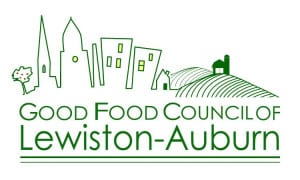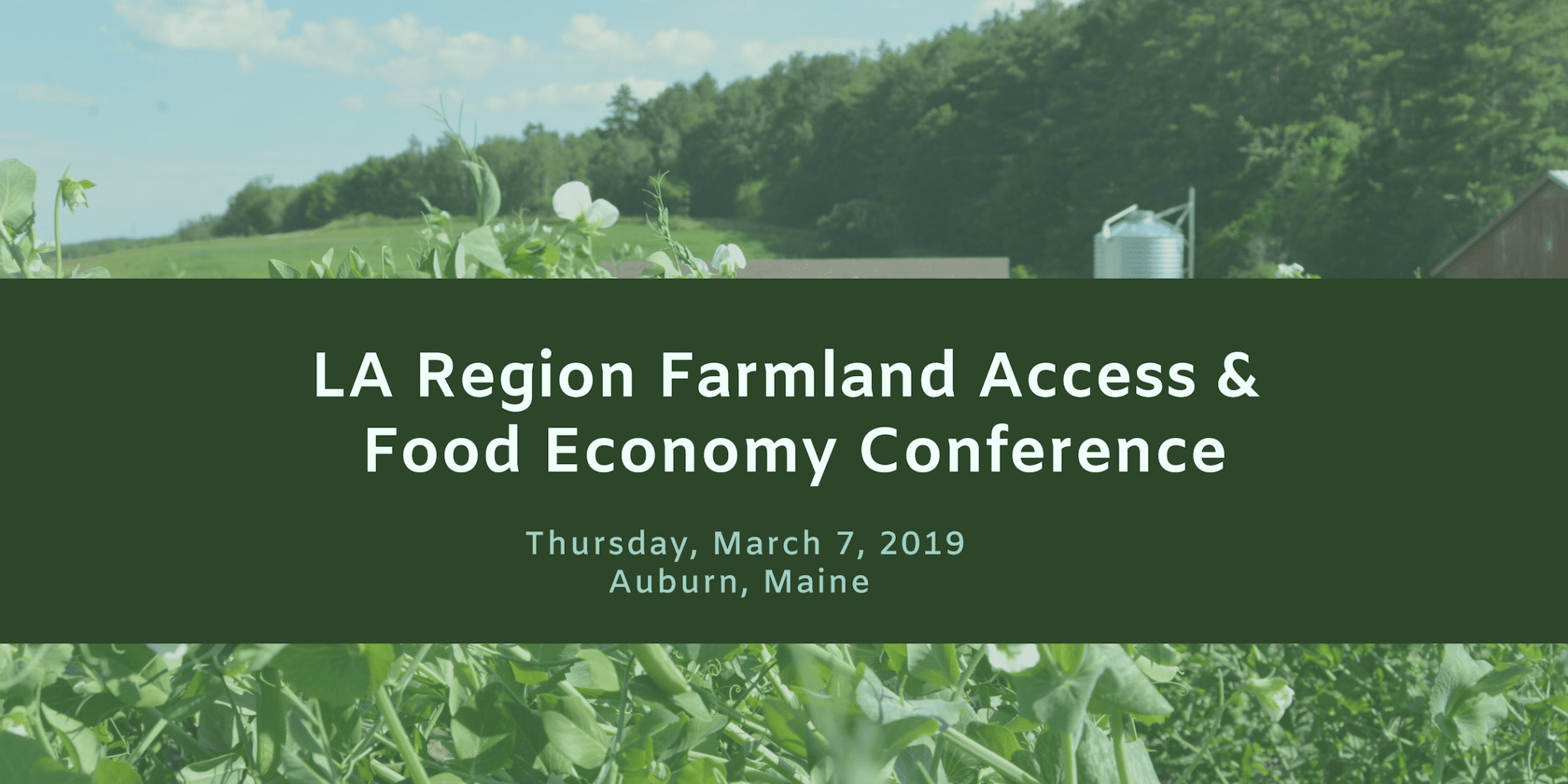
The following is an excerpt of the Welcome comments made to attendees of the LA Region Farmland Access and Food Economy Conference on March 7th, 2019 in Auburn by Julia Harper, Coordinator of the Good Food Council of Lewiston-Auburn (GFCLA).
- “Welcome to the LA Region Farmland Access & Food Economy Conference. I want to thank you all for being here, and filling up our venue here to the brim.
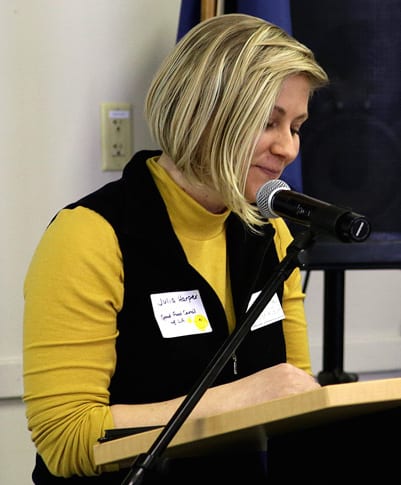
Julia Harper, Coordinator of the GFCLA delivers the welcome comments of the LA Region Farmland Access and Food Economy Conference on March 7, 2019. Photo by Gary Stallsworth.
- The Good Food Council of LA was lucky to find a unique group of talented and passionate planning partners that have helped us further refine and execute all the details of this conference from the logistics to the program, and I would like to express our deep gratitude to them for this unique collaboration that has not only created the event for us morning, but has also planted seeds for future collaborative projects to support farmland access, the food economy, and potential various other worthy food projects yet to be imagined: Our planning partner organizations include, Cooperative Development Institute, the Somali-Bantu Community Association, Androscoggin Land Trust, St. Mary’s Nutrition Center, Maine Farmland Trust, Land for Good, Cultivating Community, Land in Common community land trust, and the Maine Department of Agriculture, Conservation, and Forestry.
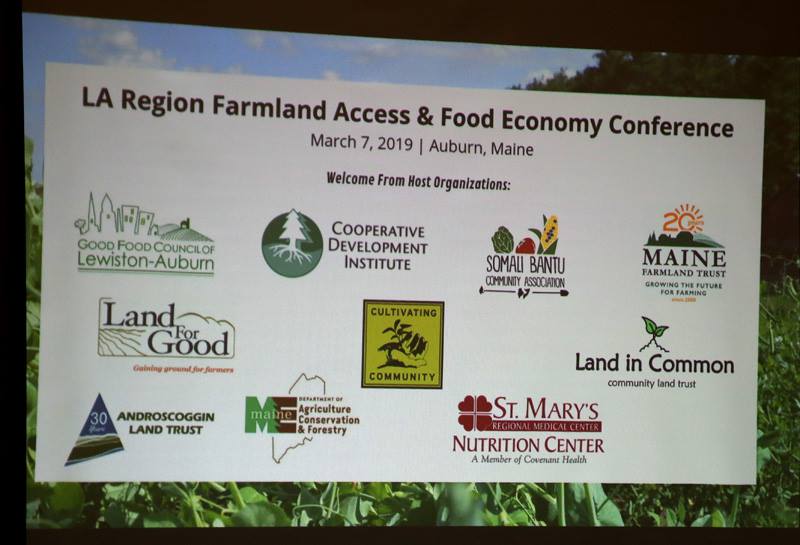
Photo by Gary Stallsworth.
- The idea for this conference was sparked last year when the GFCLA, which aims to support systemic improvements for a healthy local food system, was listening to various organizations and individuals speak about their searches for parcels of land to farm in the LA area, and simultaneously hearing that there were a number of landowners in this area who would like to make greater use of their land, as well as local farmers reaching retirement age and wondering if they would be able to sell to a farmer who would continue to steward the working land, or the market. We had also been following the City of Auburn’s process to make changes to their Agriculture and Natural Resource Protection Zone containing 20,000 acres. We thought the time seemed right to try to create an event to match local land-seekers with landowners, and also to bring in community and economic development professionals, city and town officials, staff, community members and service providers to discuss the incredible opportunities we have in our region to support more food and farm economic development. We’ve witnessed other communities benefit from intentional inclusion of food and farm businesses. And, we’ve heard from countless others who wished they had done so before quality land and community heritage were lost forever. It seems now is the time to raise this conversation here in L-A. You all have proved today by selling out this conference that this region was eager for these kinds of conversations.
- Before I proceed further, because this event centers on land, we’d like to take a moment to acknowledge the original stewards of the land we are on today, the Abenaki tribe of the Wabanaki people.

Attendees of the LA Region Farmland Access and Food Economy Conference on March 7, 2019. The event “sold out” at 100 capacity. Photo by Gary Stallsworth.
There are challenges great and small to ensure support food and agriculture:
- Transferring existing farmland is complicated. There needs to be a perfect match, and there are many additional considerations for both the farm-owner and the farm seeker. It often takes a team approach, both parties need “people” for: Legal, Financial, and Managerial assistance. Know that if you are in this process on either side that you are not alone, and that the service providers here today are your best allies in this work – they are here to help.

Some displays of service providers providing resources for farmland access and transfer, and conference sponsors, Farm Credit East and Cooperative Development Institute. Photo by Gary Stallsworth.
- According to Maine Farmland Trust, less than 4% of the land in our state is prime agricultural soil. Of that, 1% is already developed or in the process of being developed, and 1% is conserved. Those who believe in growing the potential of local food in Maine, therefore, are working to secure the last 2% of prime ag land for working farmland production. In Maine there is a tension between development pressure and farmland – and fragmentation of the land will threaten the viability of current farms. In addition, farms are an asset that take decades to cultivate, and once something is developed, it is very difficult to reclaim it back.
- 400,000 acres of existing farmland in Maine are expected to change hands in the next 5 years due to aging farmers and landowners, this rises to 400 million acres across the nation.
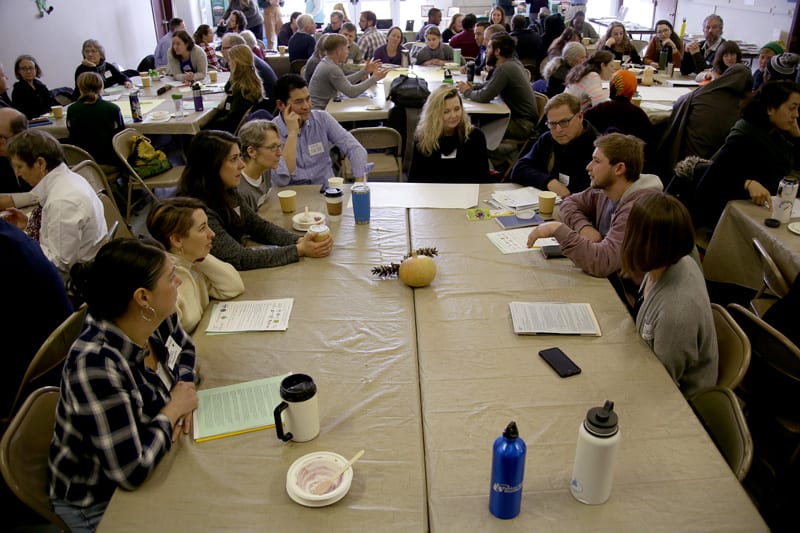
Photo by Gary Stallsworth.
- Food Insecurity, or hunger, in Maine is high. According to Good Shepherd Food Bank, Maine ranks 9th in the nation for food insecurity, and 1 in 5 of Maine’s children are food insecure. While hunger and poverty are systemic issues, and not addressed only by proximity to fresh, local food production, a viable local agriculture sector does play an important long-term role in increasing access.
- On a global scale, the United Nations has urged that food production globally must double by 2050 to meet demand from the world’s growing population. At the same time, industrial agriculture that dominates our food system is the single biggest contributor to our changing climate crisis. “Innovative solutions” were called for, and sustainable agriculture and livestock that keeps soils healthy, creating carbon sinks, is being seen as important to mitigating climate.
- Food and farm businesses have often been excluded from economic and community development strategies. However, there are examples from across Maine and New England of communities that have benefited from integrating food and agriculture into their economic development plans and community identities; ones that Lewiston-Auburn can learn from.
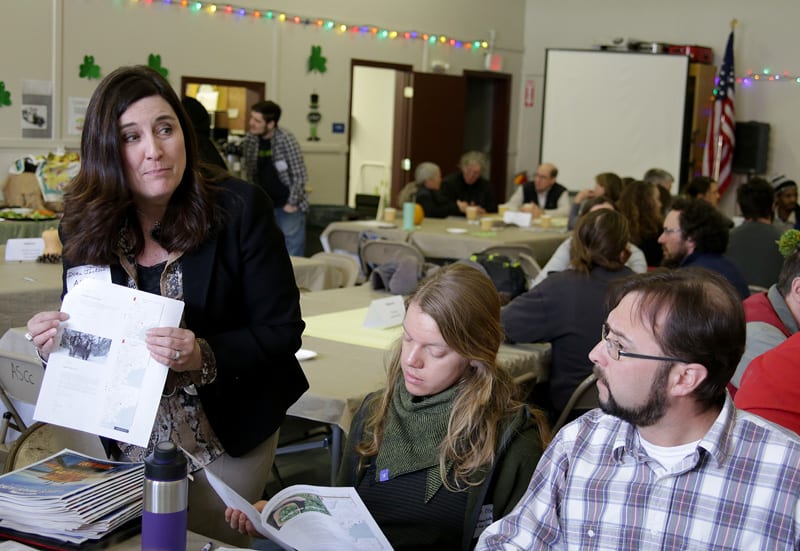
Dina Jackson, Economic Development Specialist with Androscoggin Valley Council of Governments (AVCOG) shares a resource with her group. Photo by Gary Stallsworth.
There are also opportunities great and small to ensure support food and agriculture, ones that we are excited to explore with you today:
- In the nation’s oldest state that is now projected to have more old people than young people by 2020, farming is one of the largest sectors bringing younger people to Maine, with 40% of farmers currently aged 34 or younger. In fact, the State of Maine is the only state in the nation to experience an increase in the number of young and beginning farmers – those who are seeking to “Grow It Here”.
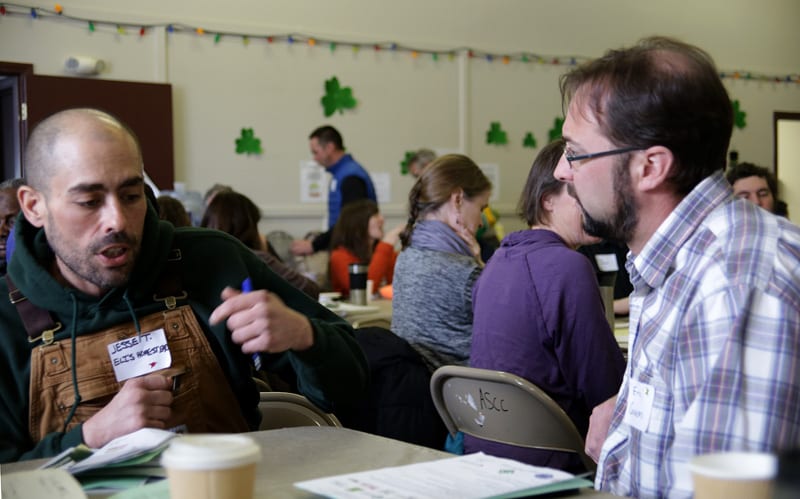
Jesse Tannenbaum, of urban farm in Lewiston, Eli’s Homestead, dialogues with Eric Cousins, Deputy Director of Economic and Community Development, City of Auburn. Photo by Gary Stallsworth.
- Having a robust Farming and the Food Sector brings many benefits to our community, including:
-
- Higher local food security, which has many ripple effects, including ensuring a healthy and robust local workforce
- Quality of life benefits, which are also attractive to grow our population and tax base, including a boost in health with access to the healthiest and most tasty food, an increased diversity in recreational and community activities, and important environmental benefits of sustainable practices.
- In addition, farmers and those who care for the land, often have shared values of engagement in community. This is tied to an increase in workforce development, as in the case of most farms, one or more family members usually maintains jobs off the farm in the community.
- Tourism trends also point to a reason for investment for food, ag, and land conservation. According to the Maine Office of Tourism, when surveyed, tourists to Maine site the #1 reason for visiting as “Activities”, and #2 is “Food/Beverage/Culinary”. In addition, sustainable and adventure tourism are on the rise. Agritourism combines these two tourist magnets trends, from on-farm hard cider tasting, to farm-to-table dinners – local businesses that excel in agritourism include Wallingfords and Nezinscot Farms.
- There are over 100 New American farmers in the Lewiston-Auburn area who are starting farms and/or are searching for their own farmland to purchase or lease in or close to Lewiston-Auburn. As one of our storytellers, Muhidin, will expand upon in a moment, farming is deeply rooted in the Somali-Bantu culture and way of life, both of which are threatened by limited access to farmland for their next generation.

LA farmland seeker, Lucas Flach, chats with Muhidin Libah, Director of the Somali-Bantu Community Association, who represents many New American Farmers and as an organization are actively seeking to purchase 50+ acres in LA for a community farm. Photo by Gary Stallsworth.
- The City of Auburn is currently considering changes to its Agriculture and Natural Resource Protection Zone, within which 40% of the city’s land mass – over 20,000 acres – is contained, and which also contains areas of prime and state-wide significance agricultural soils. This land has largely remained undeveloped for the last 50+ years, but the zoning was so restrictive it also prevented new farmers from getting onto the land. This land has an incredible story to tell, and current efforts to craft a new ordinance have potential to make it attractive to a growing population of young farmers and food entrepreneurs. LA has close proximity to southern markets and infrastructure such as transportation, making the bright for this opportunity.
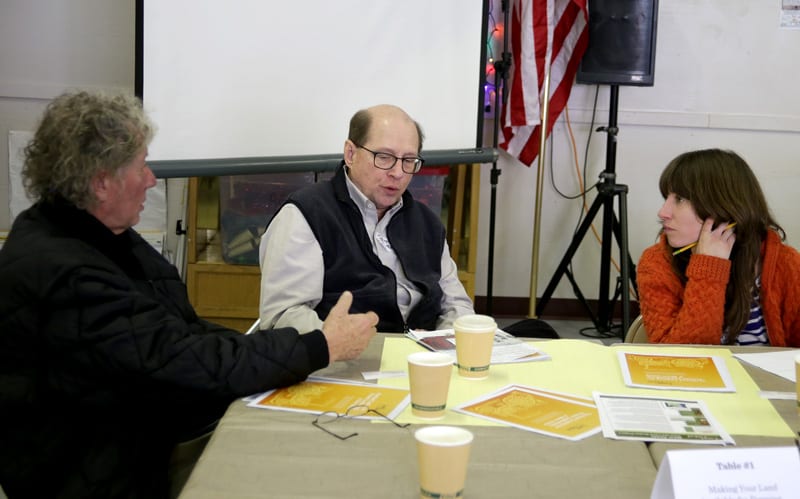
Auburn landowners Donald Carter and Peter Moore, dialogue with Abby Sadauckas, Maine Field Agent at Land For Good. Photo by Gary Stallsworth.
- Many farming families rely upon land conservation as part of their business viability. Conservation land is an important piece of comprehensive economic development strategies. It provides stability for natural resource-based industries, opportunities for public recreation, supports our quality of life, supports the tourism industry, and not to mention cleaning the air and water.
- In 2014, the City of Portland won a federal manufacturing designation for food and agriculture — just 1 of 12 awarded nationally — indicating a bright future for investment in food manufacturing infrastructure just 30 miles South of the LA region.
- Maine already has over 8,000 farms that produce $3.8 billion in sales and create 24,000 jobs according to Maine Farmland Trust. The demand for local food products continues to grow and there is opportunity for L-A to stake a claim in this growing trend.
- The Maine state policy climate is also now ripe for investments in food and ag, as Maine Lawmakers are currently energized about food issues, submitting nearly 30 bills this January for consideration related to supportive food and farm policy from improving the State’s food processing infrastructure, to enhancing statewide food self-sufficiency by increasing the consumption of Maine foods in state institutions and schools.
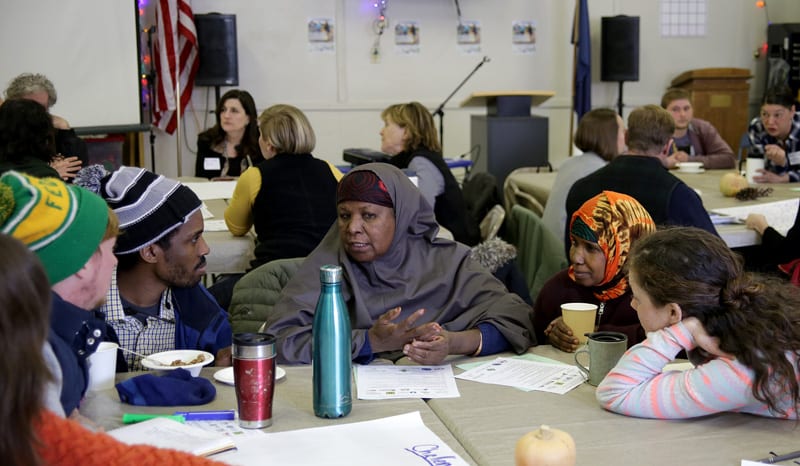
Seynab Ali, farmer-owner of New Roots Cooperative Farm in Lewiston, shares thoughts with other conference attendees. Photo by Gary Stallsworth.
With our community needs in mind, our planning team developed the broad goals and outcomes for our conference today. We imagined this event would bring together unique stakeholders with their own wisdom, and we’d focus on peer to peer sharing, learning, and relationship-building. As such, we ask of you today to be mindful of one another and to share the conversation space. The goals and outcomes, we want to see in the next few years include:
- Goal 1: More working farmland utilized in Auburn, Lewiston, and surrounding towns.
- Goal 2: Economic development opportunities increase for food and farm business as demonstrated by the cities of Auburn, Lewiston, and surrounding towns enacting new “farm friendly” policies/programs.
- Goal 3: Food and Farm-friendly policies become a publicly held goal as understanding increases around why land access/security is essential for whole systems economic development (not relegated to a charitable cause).
- Goal 4: Sustainability of land access is achieved for current and future aspiring farmers/food producers.
- A Key Outcome is : Increased engagement and collaboration between farmers, landowners, city staff and officials, and residents.
- We also see this event as part of a Continuum – and we do plan to capture your feedback from today, and figure out what the next steps are keep the work going… so please do provide us with your feedback in the post-event survey, and reach out to the GFCLA, join our e-news, if you are interested in opportunities to keep in touch about these issues.”
